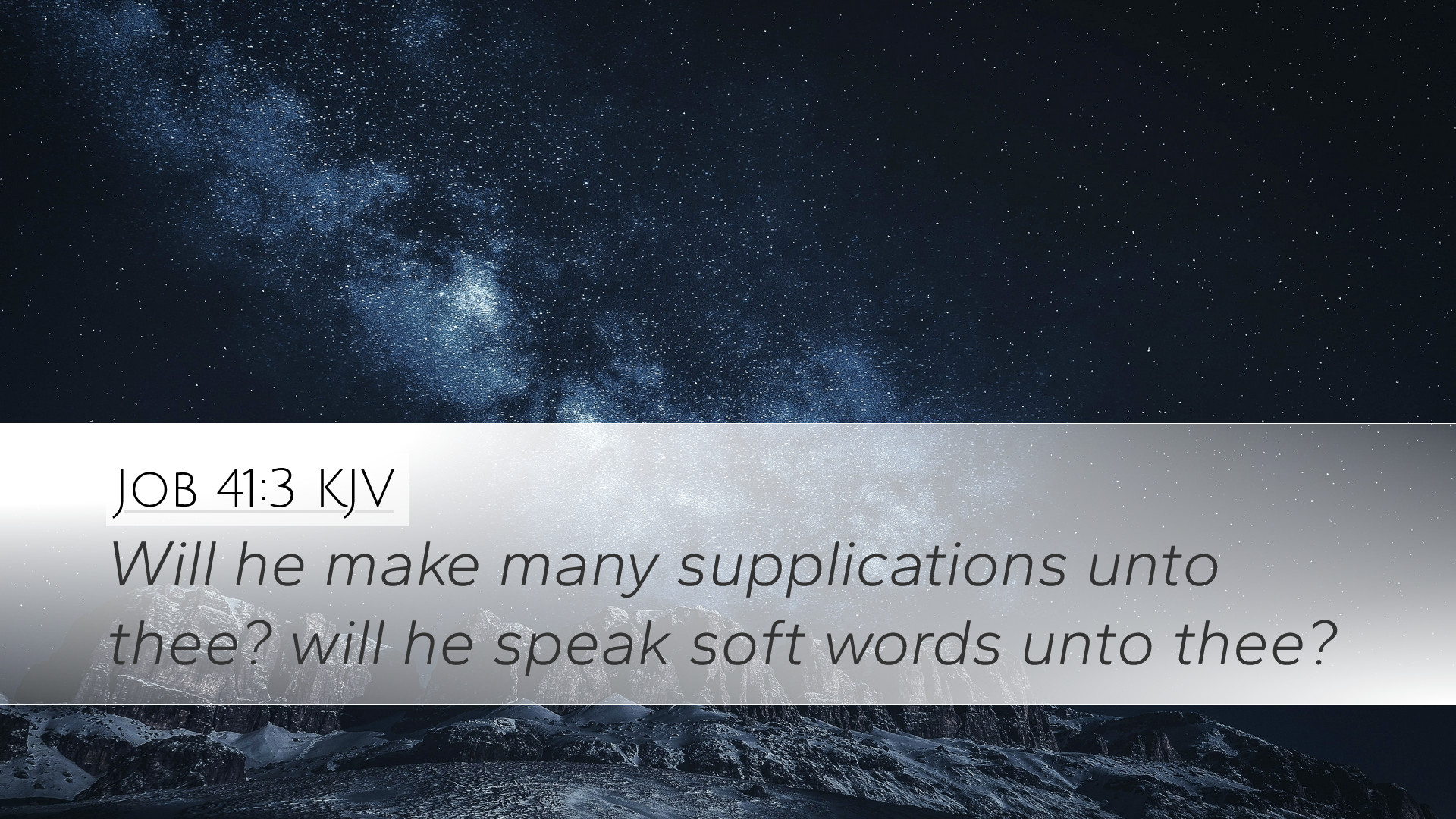Commentary on Job 41:3
The verse Job 41:3 states:
"Will he make many supplications unto thee? will he speak soft words unto thee?"
This verse sits in the context of a larger discourse where God is illustrating His power and sovereignty over creation, particularly through the metaphor of the Leviathan, a creature symbolic of chaos and untamable forces.
Overview of Job 41
In Job chapter 41, God continues His challenge to Job, emphasizing the vast gulf between the Creator and His creation. The Leviathan serves as an emblem of God's unparalleled power, showcasing qualities that no human can even begin to comprehend or tame.
Insights from Matthew Henry
According to Matthew Henry, the questioning of whether the Leviathan would "make many supplications" is laden with irony. The creature, fierce and proud, is not one to submit softly or plead for mercy. Henry highlights that this questions the nature of both the creature’s disposition and the futility of arguing with God—the Leviathan exemplifies the unyielding strength of God’s creation.
- God’s Challenge: Henry asserts that God’s inquiries are not merely rhetorical; they are intended to humble Job by showcasing the absolute power of God over even the most fearsome of creatures.
- Pride and Submission: The inquiry also reflects the broader theme of pride where the Leviathan, despite its might, would not lower itself to plead. Similarly, humans are challenged to reflect on their own humility before God.
Insights from Albert Barnes
Albert Barnes adds another layer of understanding to this verse. He notes that the supplications and soft words denote a posture of humility that is absent in the Leviathan. This speaks volumes about the nature of God's creation; even the fiercest of beings is completely subservient to the Divine will.
- The Nature of the Leviathan: Barnes articulates that the Leviathan, possibly a reference to a crocodile or a metaphor for a powerful sea creature, embodies the chaos that lies beyond human control.
- Human Limitations: He emphasizes that humans, when engaging with such creatures, would find themselves at a profound disadvantage, reinforcing the need for reliance on God’s omnipotence.
Insights from Adam Clarke
Adam Clarke provides a detailed linguistic analysis of the Hebrew text, emphasizing the implication of 'soft words.' He suggests that these words signify pacification or enacting a false sense of control over something inherently uncontrollable.
- Implications of Dialogue: Clarke posits that this dynamic reflects the true nature of God’s supremacy; rather than seeking dialogue, the Leviathan’s existence reminds us that some forces exist solely to reflect God’s majesty and our inability to alter His designs.
- Reflection on Human Frustration: Clarke also relates this to Job’s plight—which is characterized by unanswered pleas to God, contrasting the Leviathan's unyielding nature with Job's desperate, yet respectful, supplications.
Theological Reflections
This passage serves as an overarching reminder for theologians and scholars of the need for humility when grappling with divine mystery. God's sovereignty over creation is an invitation for us to recognize our place within the created order, drawing near not with demands, but with reverent awe.
Key Themes
- Divine Sovereignty: The juxtaposition of Leviathan and God illustrates the former's complete subjection to divine will.
- The Human Condition: There lies a profound connection between Job’s inquiries and the sovereign response of God, emphasizing the importance of trust amidst human suffering.
- Nature of Prayer: The passage indirectly critiques how humans approach God; we should not presume that our requests or furious arguments could sway the One who commands even the fiercest creatures.
Conclusion
Job 41:3 encapsulates the intricacies of divine-human interaction, particularly in contexts of suffering and despair. As Job contemplates the majesty of God's creation, he is invited to recognize the limitations of his own understanding and the futility of his challenges against the divine order. For students, pastors, and theologians, this verse challenges one to approach God with reverence, acknowledging His supreme authority over all creation.


